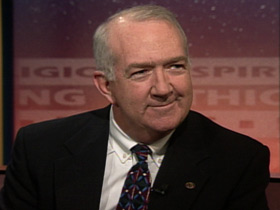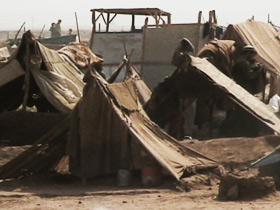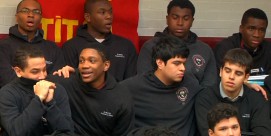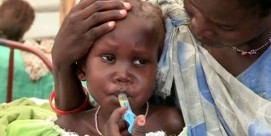Afghanistan’s Refugees
BOB ABERNETHY: Mr. Hackett is with us now. Welcome. There have been a lot of estimates all over the place about the extent of the need within Afghanistan. What’s your estimate?
KENNETH F. HACKETT (Executive Director, Catholic Relief Services): Our take on the situation is that this is the poorest country in the world, and it has suffered years of war, and now three years of drought. So, before the current situation, these people were in tragic circumstances.
ABERNETHY: So what now, people are leaving their home? They are starving? What’s going on?

HACKETT: Now we face a winter. And some of the people are starving. They are starting to move around the country. The bombing has caused people to move, and we could see a situation this winter — that if we cannot get enough food assistance and other winterization material in, the people could starve in their homes.
ABERNETHY: Is there a choice to be faced between continuing the military action on the one hand — trying to drive out the Taliban — and on the other hand, providing the humanitarian aid?
HACKETT: I don’t think the choice is that clear. We want to stop the support for terrorism; we firmly agree with that and I think everybody agrees with that. But at the same time, I think if we put our will to it, we as a group of nations and a group of agencies can get food assistance in there, can get blankets and material to help [make sure] that people really recover this winter.
ABERNETHY: And the situation in Pakistan, let me take you back to what you saw there in the refugee camps. How many people overall do you think are, in Pakistan, refugees?
HACKETT: Well, there is over two and a half million. Many of them are not registered. Some live around camps but most live in camps. We visited two camps. Both had about 60 to 70 thousand people in them. One of the camps, the population had been there about 10 years and they are fairly stable — living on the margins of existence — but stable. The second one was somewhat troubling in the sense that people did not have adequate tenting and temperatures are dropping. People are going to die in that camp unless something is done within the next week or so. We hope we can.

ABERNETHY: Can you meet that need?
HACKETT: We are ready to. We are in negotiations.
ABERNETHY: What is the problem?
HACKETT: Well, you’ve got to deal with the government, you’ve got to deal with the bureaucrats, you’ve got to deal with the security considerations. We are on it. I think we are putting our will to it; now that we have had a chance to get into one of the camps, we can make a difference.
ABERNETHY: What did you hear about the politics in the Muslim world, about what is going on in Afghanistan?
HACKETT: The people I met with, Muslims and Christians, were a little bit perplexed about the bombing. And about what the motives were. And basically they are saying to us, “We are looking for peace here, we are not looking for further military action.”
ABERNETHY: Many thanks; welcome home. Ken Hackett of the Catholic Relief Services.







